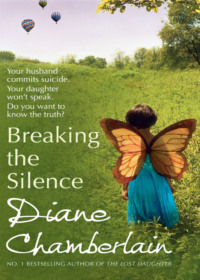
Полная версия
The Shadow Wife
“Name her,” he said, thinking protectively of the little white-haired angel he held in his arms.
The nurses told him Delora’s antipathy toward the second twin would pass in time. She would love both her babies equally, they said. Right now she was in too much pain to think about anyone other than herself. They did not know, and neither did he at the time, what Delora had known all along: she truly had room enough in her heart for only one child.
Lisbeth didn’t help matters. She was a difficult baby, colicky and forever waking her sister with her howling and fussing. But Franklin often blamed himself for Delora’s attitude toward the little girl. He never should have named her Lisbeth, because it set up yet another negative association between the infant and something Delora loathed: his mother. He should have let Delora pick a name. Make that baby hers. “Mr. Kling?”
Franklin turned now to see Rosa at the door to the terrace.
“Supper,” Rosa said, her voice still tinged with a Mexican accent, although she had been in this country three decades. “Come inside, girls, and get washed up.”
Dinner was served in the grand dining room, which looked out over the sea. Rosa served them, as she had served Delora’s family before Franklin had moved in. She was not the best housekeeper in the world, but she had a warmth about her that had charmed Franklin from the start. He liked that she treated the twins equally, and she had even complained to him once, with apologies for overstepping her role, that she thought it unfair that only Carlynn went to the Douglass School while Lisbeth did not.
Over dinner, Delora questioned Carlynn about her day at school, while Lisbeth nibbled her food, a small shadow in the room. When Delora stopped for breath, Franklin broke in.
“Who wants to go sailing with me tomorrow?” he asked and saw the instant sparkle in Lisbeth’s eyes. He’d asked the question just to bring that joy into her face.
“I do!” she said.
“How about you, Carlynn?” he asked his other daughter.
Carlynn shook her head. “No, thank you,” she responded, as he knew she would. Carlynn had hated the water ever since their sailboat capsized in Monterey Bay a couple of years earlier. The girls had been wearing life jackets, but the water was freezing and the whole experience had been frightening, particularly for Carlynn. Lisbeth still loved to sail, but Carlynn decided she would never go on the water again. That was fine with Franklin. Carlynn had many opportunities for adventure at school, and he wanted Lisbeth to have one for herself. A pastime she could love, at which she could learn to excel.
At the end of the meal, Delora looked across the table at Franklin, and he knew she was asking him if they should remain in the dining room to tell the girls about Presto. He mouthed the word library, and Delora stood up.
“Let’s go into the library, girls,” she said. “Your father and I want to talk with you.”
Franklin led his family across the foyer into the library, dreading the conversation he knew was coming.
Delora and Carlynn sat on the love seat near the window, while Franklin and Lisbeth opted for the wing chairs. The girls looked apprehensive. They were rarely invited to participate in family discussions such as this.
“You tell them, Franklin,” Delora said.
Franklin looked from one daughter to the other. “Presto is very sick,” he said.
Both girls glanced in the general direction of the kitchen, where they knew Presto slept by the stove. Neither of them spoke.
Clearing his voice, Franklin continued. “I’m afraid he’s going to die.”
“No!” Carlynn cried, instantly in tears, and Delora pulled her close, trying to smooth her unsmoothable hair.
“Hush, darling,” she said. “It will be all right.”
Lisbeth’s hands were locked on her lap and she sat motionless, quiet. But her eyes glistened.
“Tomorrow,” Franklin said, “we will take him to the veterinarian to have him … put down.”
“Killed?” Carlynn wailed. “Please don’t, Daddy. Mommy?” She looked at her mother with hope.
“He’s suffering, Carlynn,” Delora said. “He’s having trouble breathing, and you know how he can hardly walk these days.”
“He’s nearly blind,” Franklin added. “And we want to end his misery, Carly. It’s not fair to make him go on like this when we can help him die, so he doesn’t have to be in pain any longer.”
Carlynn nestled against her mother’s breast, sobbing quietly now, and Franklin saw the tears in Delora’s eyes. She was not an insensitive woman, just limited in her capacity to love. Lisbeth’s mouth was downturned and quivering, as though she was struggling to control her emotions, and a fat tear spilled from each of her eyes. Franklin walked over to the ottoman in front of her chair and sat down on it. Leaning forward, he covered her hands, still folded in her lap, with his own. “Are you all right, Lizzie?” he said.
Lisbeth nodded, biting her quivering lip. She was brave. Stoic. He felt a lump in his throat. No one appreciated this child except him.
But that was not exactly true. Carlynn drew away from her mother to see the pain in her twin sister’s face. Jumping up from the love seat, she ran across the room to hug her. “I won’t let them do it, Lizzie,” she said, as though she had forgotten she was only a child.
But Lisbeth knew the limitations of a seven-year-old. She nodded, as if she was humoring her sister, but Franklin saw that the sorrow never left her eyes.
That night, Carlynn slept on the kitchen floor, her arms locked around Presto’s failing body. Franklin and Delora tried to force her to come upstairs to bed, but she wouldn’t budge from the dog’s side.
“Let’s let her be,” Franklin finally said to his wife. “Let her have one last night with him.”
Delora agreed. She watched as Franklin covered the little girl with a comforter, squatted down to kiss the top of her head, and stroked Presto’s side. Then he and Delora went to bed.
The dog’s rasping breaths could be heard throughout the mansion. Carlynn spent the night whispering words to him, of comfort or love, or pleading, no one really knew, but the fur on his neck grew wet from her tears.
In the morning, everyone in the house awakened to the sound of Presto’s barking. They came downstairs to find him sitting up next to Carlynn, his breathing even and strong. Carlynn put her arm around the dog’s broad shoulders.
“Presto’s hungry,” she said simply, and Lisbeth ran over to embrace first the dog, then her sister.
The vet would later say that he must have misdiagnosed Presto’s condition, that he had judged it to be far more serious than it actually was. Maybe that was so.
And maybe it wasn’t.
7
THE CALL CAME JUST AS JOELLE WALKED IN THE DOOR OF HER condo that evening. Dropping her purse and appointment book on the kitchen counter, she picked up the receiver. “Hello?”
“I’m trying to reach Shanti Angel.” It was the voice of an older, possibly even an elderly, man—a deep, rich voice with an edge of refinement.
“This is Shanti,” she said.
“I’m calling you for Carlynn Shire,” the man said. “She got a message that you would like to meet with her?” “Yes,” she said, “I would.”
“And you have some special connection to her?” he prompted, and she repeated the story of her birth to him.
“Well, Dr. Shire said that if you’d be willing to come over to the house, she’d be happy to talk with you.”
“Does she remember me?” Joelle asked.
“She says she does.”
Joelle couldn’t help but smile. “I’d be happy to come to her home. Just tell me where and when.”
“She could see you next Tuesday at noon.”
That would be right in the middle of her workday, but she didn’t dare ask for a different time.
“That will be fine,” she said. “What is the address?”
“Are you familiar with the Seventeen Mile Drive?” he asked.
“Yes,” she said. Everyone knew the Seventeen Mile Drive. The Carmel entrance was not that far from her condominium. She’d only been on the drive a few times, though, since there was a fee for the privilege of entering it. It was visited mainly by tourists who wanted to view the wonder-filled coastline of the Monterey Peninsula—and by the residents lucky enough to live along the route.
He gave her the address, telling her the house was near Cypress Point. This would be no simple “house,” she thought.
“When you turn into the driveway,” he continued, “you’ll need to press the buzzer on the column to your left. You’ll see it. I’ll open the gate to let you in.”
“Thank you.”
“Oh, and just let the fellow who takes the toll for the Seventeen Mile Drive know that you’re coming here, to the Kling Mansion,” the man added. “I’ll let him know to expect you. You won’t have to pay.”
“Thanks,” she said. “That will be great.”
She hung up the phone and wrote down the appointment time in her book. It would be interesting to meet Carlynn Shire, if nothing else, and it would be fascinating to hear her side of the dramatic story of her birth. She would tell Carlynn about Mara and see what she had to say. But she wouldn’t tell Liam what she was doing. He would think she’d gone off the deep end.
And, she thought, he might be right.
The following day, Joelle found herself sitting at the nurses’ station in the maternity unit next to Rebecca Reed, the perinatologist in charge of the department, as they both wrote notes in medical charts. Joelle wished she could tell Rebecca about her pregnancy. From the corner of her eye, she watched the doctor’s slender hand move across the page as she wrote, her handwriting far neater than most of the other physicians’ in the hospital. Even when she wrote, Rebecca had an air of confidence, of taking charge. She was thirty-nine and beautiful, her long blond hair pulled back from her face with a clip at the nape of her neck.
Rebecca had helped Joelle find a fertility specialist when she and Rusty were going through their failed attempts at conception, but, although Rebecca was a skilled and respected physician, she possessed little warmth. She was not a nurturing sort of doctor, not a hand-holder. Joelle would have loved it if, right then, as they were sitting side by side, she could have confided in the doctor. She couldn’t bring herself to talk with her that easily, though. Joelle could converse with almost anyone, but she’d never felt completely comfortable around Rebecca. The few times they’d been at parties together, small talk had been awkward and difficult.
Still, until she moved away, which she had definitely decided to do, she wanted Rebecca to be her obstetrician. Her plan was to tell the doctor when she was twelve weeks pregnant, at the end of her first trimester. Joelle, herself, would have scolded any woman who waited that long for a first prenatal appointment, but she simply didn’t want to let anyone in on her pregnancy until it was absolutely necessary.
Rebecca’s pager went off, and she took the time to close the medical chart in which she was writing and carefully cap her pen before removing the pager from the waistband of her skirt to check the display. Reaching for the phone on the counter, she glanced at Joelle.
“It’s the E.R.,” she said, and Joelle nodded.
Writing her own notes, Joelle listened to Rebecca’s end of the phone conversation, wondering if the case might be something in which Liam would need to be involved. She couldn’t tell, since Rebecca was doing more listening than talking.
Rebecca hung up the phone. “Have to run,” she said, standing up. She smoothed her skirt with both hands, then picked up her notebook and pen. “They’re paging Liam, Joelle, but you might eventually need to be involved in this. A car accident’s coming in. A pregnant woman, thirty-eight weeks, and her husband. Husband’s okay, but the woman isn’t expected to make it. I’ll have to meet them in the E.R. to see if we can save the baby.”
“Let me know if the baby ends up coming here,” Joelle said. If the child survived, it would most likely be rushed to the neonatal intensive care unit, and the case would certainly become hers.
Right now, though, it was Liam’s. She pictured Liam trying to handle a situation in which a wife dies, a baby lives, and a husband grieves. Standing up, she closed the medical chart and rested it back on the lazy Susan. Too close to home for him, she thought. This would kill him. She headed down the hall in the direction of the emergency room.
8
LIAM WAS ABOUT TO LEAVE THE E.R.TO HEAD UP TO THE CARDIAC unit when Rebecca Reed whisked past him. She touched his arm as she rushed by.
“Don’t go yet,” she said. “We’ll need you.”
“What’s going on?” He heard the sirens outside the doors of the E.R., but Rebecca didn’t stop to answer him. Typical Rebecca.
One of the nurses who had overheard their conversation stopped briefly near Liam as she headed toward the front door.
“It’s a car accident,” she said, glancing in the direction of the ambulance. “Husband is all right, but the wife went through the windshield and died on the way in.” She started walking again, then added over her shoulder, “And she’s pregnant.”
Liam stood near the corridor that led from the E.R. to the rest of the hospital and felt the numbness come over him. This happened to him every once in a while. It was not an emotional numbness, although he supposed that was part of it. Instead, it was a literal paralysis that started in his feet and rose to his chest until he could barely pull any air into his lungs. He stood there feeling thick and stupid and wanting to escape. He could leave and pretend he had not been caught in time to handle this case, to deal with the husband who was “all right.” That husband would never be all right again.
Unable to move, he watched as they wheeled the woman into the E.R. toward one of the treatment rooms. Except for one streak of dried blood on her temple, her injuries were strangely invisible, and her belly was huge. Her husband walked next to the gurney, limping, perhaps from an injury suffered in the accident, and clutching his wife’s lifeless hand. They were both in their thirties, Liam guessed.
One of the nurses left the side of the gurney to step over to Liam. “Take care of the husband, okay?” she said, and he wondered if she could see the panic in his eyes. “He’s physically fine, but emotionally—”
“I’ll do it.”
Liam turned at the sound of the voice behind him. Joelle.
“I heard what was happening,” she said, touching his hand, then quickly drawing her fingers away. “Since the baby will eventually be in my unit, I thought I’d come down and take over. If that’s all right with you, Liam.”
He doubted his face could mask the gratitude he felt. She knew. She’d heard about the case, and she knew he would not be able to handle it. And she’d come.
“Thanks,” he said, or tried to say. His mouth was too dry to get the word out, but Joelle had already moved past him.
Still holding his wife’s hand, the man tried to stay with the gurney as the staff wheeled it through the doors to the treatment room, but the nurses shook their heads at him and told him to let go. Liam watched as Joelle took the man’s arm, speaking quietly to him. Finally, he let go of his wife’s hand and stood next to Joelle, wearing that shocked, this-can’t-be-happening-to-us look on his face that Liam knew all too well. Joelle and the husband watched the doors to the treatment room swing shut, and Liam turned away before he saw any more.
“What shall we do tonight, Sam?” he said as he drove out of the nursing home’s parking lot, hours after the situation in the emergency room. He glanced in the rearview mirror at his son, who was buckled into the car seat. Sam didn’t answer him. He was seemingly fascinated by the handle of the door, poking it, patting it, and Liam smiled.
He was better now. He and Sheila and Sam had had their visit with Mara, and he’d managed to block the incident in the E.R. from his mind. Whenever it threatened to slip in, he thought of Sam. The ruse—replacing a negative thought with a positive—worked every time. Almost.
Now came his favorite part of the day, his time alone with Sam. Sam was pure joy. He knew nothing of sorrow, nothing of the sad circumstances of his birth. Liam checked the rearview mirror again, enjoying the traces of Mara he could see in his son. He had her incredibly dark eyes and fair skin, but more than that, he had Mara’s spirit. It was obvious in the way he took on every new challenge with optimism and excitement.
Liam pulled into the carport of his cottage and lifted Sam out of the car seat. The maid would have come today, he thought. Good. He liked the lemony-fresh smell and the sense of order she left behind. Sheila paid to have her come once a week—one more thing for which he was beholden to his mother-in-law.
He and Sam ate dinner, then went out in the small backyard to pull a few weeds in the garden. At least Liam pulled weeds, while Sam pushed his tot-size lawn mower back and forth over the lawn. Then, while it was still light out, Liam got the bubble solution and the huge bubble wand Joelle had given them from the kitchen. He sat on the patio and blew bubbles for Sam to pop and chase in his gawky toddling run. Every time a fresh bubble slipped from the wand, Sam laughed, a tinkly, golden sound that made his eyes crinkle and showed his pearly little teeth, and Liam felt like blowing bubbles forever just to see that happiness in his son’s face.
But finally he noticed it was growing dark out, and he screwed the lid on the bubble solution. Sam’s face fell in disappointment.
“Let’s play with the blocks,” Liam said quickly, standing up, and the little boy brightened and headed for the back door.
Inside, Liam dumped the round canister of large, colored blocks onto the carpeted living-room floor, and Sam instantly grabbed one and set it in front of him, then reached for another. They’d played with the blocks nearly every night this week, and Liam could see Sam’s abilities growing. The first night, Sam had just watched Liam build a tower, then gleefully knocked it over. But the past few evenings, he was building towers himself. Well, not towers, exactly, but he was piling one block on top of another, at any rate.
“Let’s see how many blocks you can stack tonight, Sam,” Liam said. “Last night you got to three before they fell down. Remember? One, two, three.” He showed him his three fingers, then the three blocks, but Sam seemed disinterested in the number game. He was building, and in a moment he had three blocks stacked, if a bit precariously.
“That’s fantastic, Sam,” Liam said, and handed him one more. “Can you put this one on the pile? That would make four.”
Sam clumsily set the fourth block on the pile, and the stack quivered for a moment, then tumbled over, making him laugh.
They played a few minutes longer, but then Sam stepped over the blocks and fell hard into Liam’s lap.
“Oh, you wanna wrestle, do you?” Liam said, lying back on the carpet. Sam crawled on top of him, letting himself roll and fall and climb, using Liam’s body as a jungle gym. Liam had to do very little. He thought about all the toys Sheila had bought her grandson, which were piled up in Sam’s room and in the corner of the den. Totally unnecessary, Liam thought. All this kid needed for entertainment was a dad lying on the living-room floor.
“Aya-pane!” Sam said, patting Liam’s knees.
“You want to be an airplane?” Liam said. “Well, I don’t know about that. Do you know how to fly?”
“Aya-pane!” Sam giggled as he pounded harder, his hands a mere feather’s weight against Liam’s knees.
“Ok, Sammy-Bananny, you asked for it. Assume the position.”
Sam leaned against Liam’s shins, and, holding the little boy’s hands, Liam raised his legs into the air. Making airplane noises, he flew his son this way and that, while Sam laughed and shrieked, his tiny hands gripping his father’s for dear life.
“Uh-oh!” Liam said. “We’re hitting turbulence. It’s going to be a bumpy flight.”
Sam let out an anticipatory squeal even before Liam started the bouncing motion with his legs. Turbulence was great for his own abdominal muscles, he thought to himself. Good thing, too, since he hadn’t been to the gym in over a year.
Finally, he lowered his legs and Sam fell on top of him with a thump.
Liam groaned. “Rough landing,” he said.
“More, Dada,” Sam said, begging for more even though he was lying, exhausted, on his father’s stomach.
Liam laughed. “That’s enough turbulence for one night,” he said. “I think it’s bath time, now.”
Sam stood up. “Bose!” he said.
“Right. We can play with the boats in the tub.” Suddenly tired, Liam needed a few token tugs from Sam to get him on his feet.
He gave Sam a bath, then brought him into his own bed so they could look at a book together. Liam rested on a stack of pillows piled against the bookcase that served as a headboard, Sam on his lap, as they turned the pages. Finally, after two picture books, in which Sam had to name every single item in every single picture, most of them in a language only Liam could understand, the little boy’s eyelids began to droop.
Liam set the books on the night table, settled lower into the pillows and turned his sleepy son so that he was resting against his chest. He kissed the top of Sam’s head through the blond curls, the scent of baby shampoo comforting in his nostrils. He felt like hugging him tightly, but didn’t dare for fear of waking him. When Sam was still like this, Liam felt a fragility in him, a need to protect him, always, from anything that might hurt him.
“I love you, Sam,” he whispered into his son’s clean hair.
If only he could share Sam with Mara. He wanted that more than anything. Of course, he did share him with her, as much as was possible. But when he was honest with himself, he had doubts about what sort of mother Mara would have been. She’d never had an interest in children and had been nothing but candid with him about that fact. Maybe he was kidding himself to think she would have been as smitten by Sam as he was.
He’d told Mara about Sam’s first steps and his first words, but Mara had only smiled her simple smile, the same expression she would have offered if he had said that Sam had been hit by a car. Once, he’d put that theory to the test by telling Mara he had some sad news.
“Your mother died,” he said.
Mara smiled.
“She was in a car accident.” Smile.
“I made that all up, Mara,” he said quickly, upset with himself for even putting the awful thought into words. “Your mother will be here to visit you tomorrow, as usual.”
Mara’s constant smile, though, encouraged Sam to relate to his mother, and for that Liam was grateful. How long would that last, though? For how long would Sam be able to relate to her so easily, so unassumingly? Liam thought of the future—the first day of school, Sam’s teen years, his graduation, his leaving home, his wedding. When he pictured himself in the future, he was completely alone with his son.
He would always have a wife whom he loved, but who could never truly be a wife to him. Not in any way. She could not be a friend in whom he could confide or a partner with whom he could share life’s joys and sorrows. Nor could she be a lover to hold him close, to touch his body the way he hungered to be touched. He still reached for Mara in the middle of the night sometimes, only to find the cool, empty space on the bed where her body should have been. Confused for a moment, he’d turn on the light and then remember, and he’d want to scream and punch the walls. He had lost so much.
Sometimes, people who didn’t know what had happened, people in the music world, perhaps, would ask him why Sommers and Steele was no longer performing, and he’d have to explain. He and Mara had formed their little two-person folk group shortly after meeting, and they’d been fairly popular on the local club circuit. They both sang quite well, especially together, and they both played acoustic guitars. Mara would play the piano when one was available. People had commented on how well matched they were. Joelle had known that even before he and Mara had met. If it hadn’t been for Joelle, the two of them never would have been together. Liam told himself that he didn’t regret their meeting, that a few years with Mara was worth what he was going through now, but he wasn’t sure. He never sang these days, not even in the shower. He hated the sound of his voice alone. It had been Mara’s harmony that had made his voice whole.









